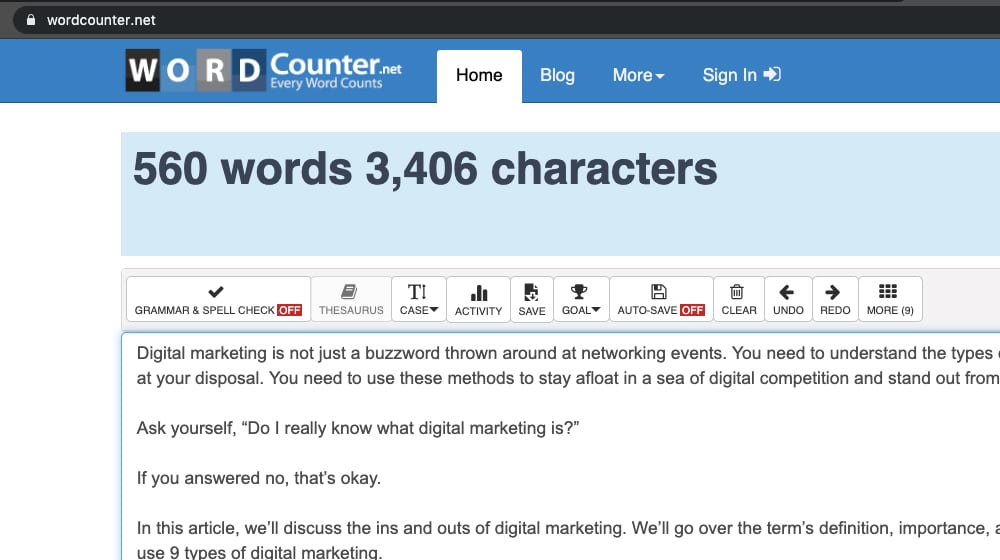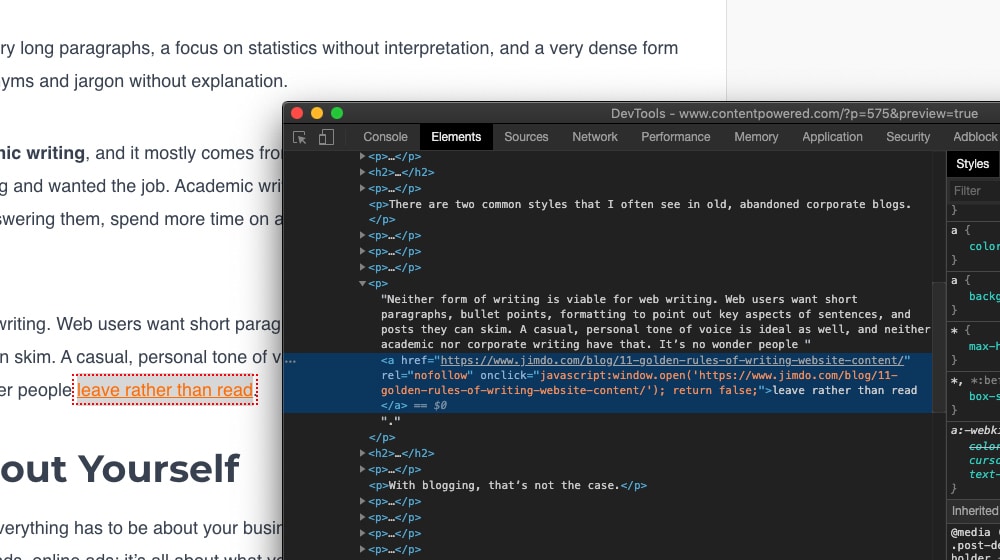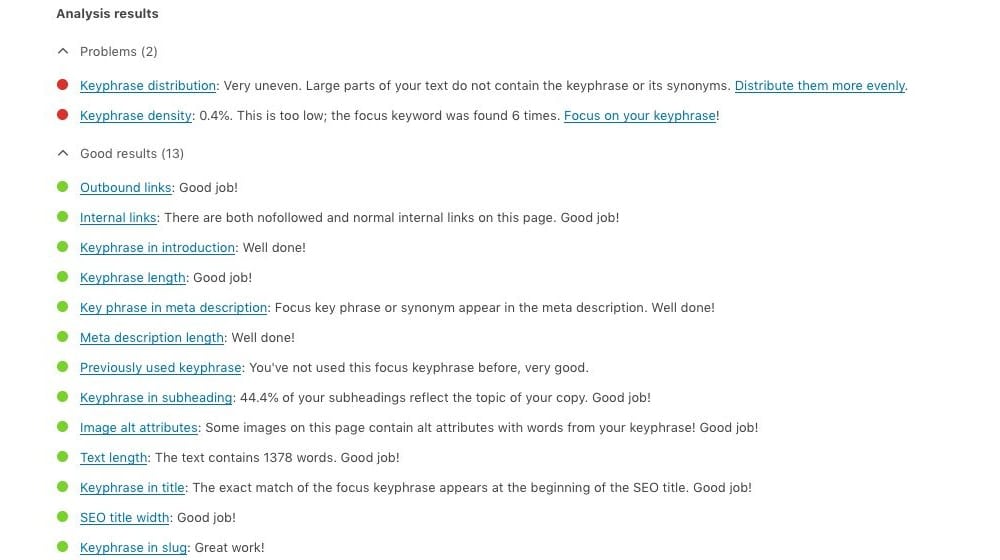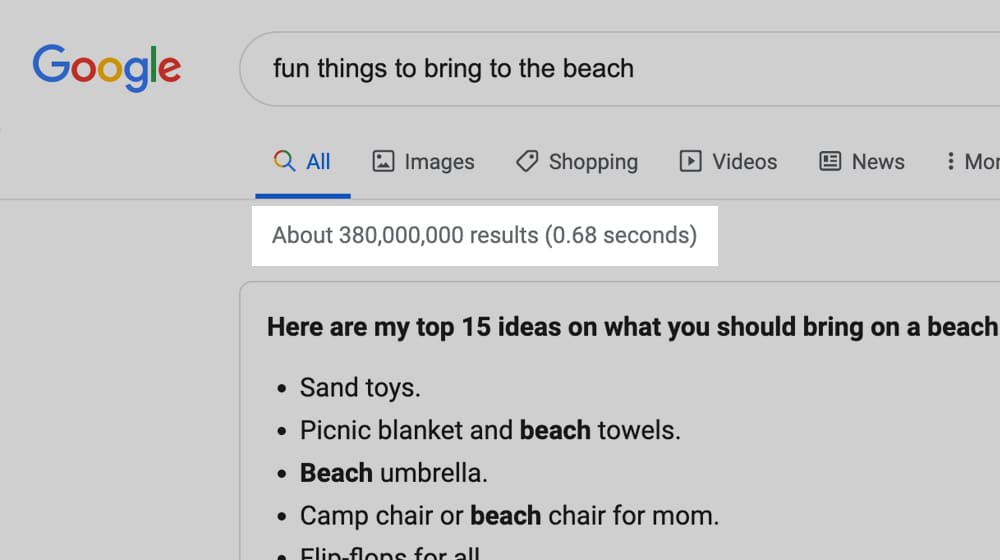How to Avoid Common Mistakes on Your Corporate Blog

Virtually every business, large or small, can benefit from a blog. Blogs drive traffic, blogs inform users, blogs build trust. They're a tool to showcase your thought leadership, a tool to attract new customers, and a tool to educate readers.
All too often, I meet with a CEO or marketing leader who says they have tried blogging before, only for it to fail. They've spent too much money for nothing in return, and they're tired of it.
My response is always the same: "You must be doing something wrong."
Throughout my career, blogging has been the backbone of growing businesses. I can attest that it works, and it works well, when you do it right. The problem is, there are a ton of different ways you can do it wrong.
With that in mind, let's look at the most common blogging mistakes made by corporations and businesses that just haven't done it right.
 30 Second Summary
30 Second Summary
Every business can gain from a blog. They attract visitors, provide information, and build trust. Common blogging mistakes include not producing long enough or purposeful content, writing in the incorrect style, only focusing on oneself or the news, overly promoting sales, and neglecting technical SEO or keyword use. Failing to research pre-existing content, inconsistent posting, failure to promote content, giving up too early, lack of direction for the reader, or not hiring a professional are further issues. Address these for a successful blog.
Not Writing Long Enough Content

It can be difficult picking a topic and writing enough about it to make a full-length blog post. It's even more difficult if you don't know what a full length blog post even is. A lot of failed blogs I see tend to write posts that are under 1,000 words long, and many under 500. That might have worked with SEO back in 2010 or earlier, but these days it's not going to cut it.
I did a study recently and found that the most common length for blog posts was around 1,000 to 1,500 words. This is a good minimum baseline for modern content. Year over year, the average length of blog posts tends to go up as people strive to out-do one another online.
Personally, I like to aim for somewhere between 1,700 and 2,500 words. Longer posts have a lot more ability to capture attention, to find places to rank in Google search, and to provide value. Particularly when you want to cover a topic in great detail, a longer post works best.
Some top-end bloggers, like Neil Patel, Brian Dean, and other high-end marketers often write blog posts with word counts in the 3K, 4K, 5K or even higher ranges. These are excellent posts and cover topics with a ton of detail, but they're also much harder to write. A slightly shorter sweet spot has worked the best for me.
Not Writing Content with a Purpose
Every piece of content you produce for your blog should have a purpose behind it. Far too often, I take a look at a company blog and I see blog posts that don't really do anything. Maybe they're just a glossary of some basic industry terms, maybe they're just baseline coverage of industry news, maybe they're an attempt at a guide that doesn't do anything that other, more robust guides do. Maybe they just meander aimlessly from topic to topic, acting more like a personal stream of consciousness than a blog post.
Before you begin writing a piece of content, determine what purpose it has. For example:
- This piece of content will educate a reader about an industry event.
- This piece of content will promote our new product launch.
- This piece of content will address a common industry problem and how to solve it.
- This piece of content will provide a usage guide for a common tool we use.
- This piece of content will answer a common question our customers have.
These are all defined purposes that guide the topic of the post, how you write it, and how it performs. It helps you attract readers who have the desire to learn more or buy something, and it helps you guide users to an appropriate next step in a conversion process.
Writing in the Wrong Language

I don't mean accidentally writing in Spanish for your English audience, here. No, I mean writing in the wrong style of language.
There are two common styles that I often see in old, abandoned corporate blogs.
The first is the dry corporate language. If you're reading something and it feels like reading a quarterly statement, or a press release, or another exceedingly dull form of writing, you're going to gloss over it or stop entirely.
Hallmarks of this style tend to include very long paragraphs, a focus on statistics without interpretation, and a very dense form of writing that makes heavy use of acronyms and jargon without explanation.
The other common style I see is academic writing, and it mostly comes from blogs where the company owner had a kid in college who was experienced with writing and wanted the job. Academic writing is fine in some circumstances, but it often takes time to posit questions without answering them, spend more time on analysis than on conclusions, and is very rote in its layout.
Neither form of writing is viable for web writing. Web users want short paragraphs, bullet points, formatting to point out key aspects of sentences, and posts they can skim. A casual, personal tone of voice is ideal as well, and neither academic nor corporate writing have that. It's no wonder people leave rather than read.
Only Writing About Yourself
There's a perception in marketing that everything has to be about your business. Indeed, with a lot of marketing, it is. TV marketing, radio advertising, magazine ads, online ads; it's all about what your business does and what value you can provide to your audience.
With blogging, that's not the case.
This attitude leads to blogs where every post is self-centered and self-focused. Posts are all about what your brand does, what your products do, how users can use your products, what value your products provide, and on and on.

People aren't usually looking for that kind of information. Worse, when they're looking for more broad, less biased information, your self-centered blog posts will push them away.
If you read through my blog here, you'll find that I almost never talk about my business or what I do. There's plenty of that around, in the sidebars and the widgets and the landing pages. I don't need to make my content about me as well.
Your blog shouldn't be telling people who good you are, it should be showing them. Provide them with information, answer their questions, solve their problems. This proves that you're knowledgeable and trustworthy, and makes them more likely to trust your product to solve their problem.
Only Writing About News

Similar to the above, some corporate blogs recognize that they shouldn't write about themselves, but they don't know what to write about. One of the easiest topics is just "the news", and industry news is a low hanging piece of fruit to pluck. This is why, for example, there are a trillion video game blogs out there, most of which have nothing of value written on them.
Basic news is always covered by the agencies that already made that their central point. If you're a financial business, what perspective do you have that makes your site better for news than Forbes, Reuters, or the Financial Times? Unless you're an industry leader, their timing, budget, and insight is hard to compete with.
Don't get me wrong, you can still cover the news occasionally, that's fine. Just don't try to position yourself as an industry go-to resource when you're just writing about stuff you see on the actual go-to resources. News comes and goes, and investing in content that will not be interested in a couple of months is a poor use of marketing dollars.
Writing Too Much for Sales

We create blog content that converts - not just for ourselves, but for our clients, too.
We pick blog topics like hedge funds pick stocks. Then, we create articles that are 10x better to earn the top spot.
Content marketing has two ingredients - content and marketing. We've earned our black belts in both.
Up above, I told you that every post should have a purpose. There's a caveat to that: every post should have a purpose that varies from other posts around it.
As a business, it's easy to prioritize sales. After all, if you're not selling, you're not making a profit, and eventually your business has to shut down. Thus, it's all too easy to rationalize forcing all of your blog posts to include heavy sales calls to action.
Most web users are tired of that kind of writing, and I bet you are too. How often have you wanted to look up a DIY guide and found post after post with instructions on how to you This Company's Product to do it, or how to hire their service to do it for you instead? It's annoying and it doesn't suit your needs.
Change up the purpose of your posts, even if some of those purposes don't seem like they would bring in a profit. They will, eventually. Trust me on that one.
Ignoring Technical SEO

There's a lot that goes into SEO, but some of the more basic technical aspects of optimization are left behind by even the basic guides, because they're so foundational to blogging success that they're almost taken for granted. Yet so many corporate blogs don't implement these basics because they don't know any better. Here's what you should look into and implement:
- Use human-readable permalink structures.
- Use easy and accessible navigation structures.
- Implement canonical URLs.
- Use SSL.
- Use structured data whenever possible.
- Use descriptive anchor text for links.
- Use alt text for images.
- Write keyword-rich, valuable meta descriptions and meta titles.
These kinds of technical elements for your page have a huge impact on how viable your site is to show on Google's search results page. They're what set you above the competition, all else being equal.
Ignoring Keywords
You may have come across articles that speak to you about keyword research, and others that talk about how keywords are dead. The reality is somewhere in the middle.
Keyword research is tricky because it's a complicated subject. Back in the early 2010s and before, keyword research was hugely important, because if you didn't hit the right keywords in the right way, your content wouldn't show up in the right Google searches.
Back then, you often saw people worrying about keyword density; that is, the number of times you used a given keyword in a piece of a given length. Too dense and you might get penalized for keyword spam, but not dense enough and your core keywords might get lost.
These days you don't really have to worry about keyword density, and even about specific exact match keywords all that much. You've probably searched Google for something and found results that didn't use your exact query anywhere; that's an evolution for Google's search. Google can parse meaning and intent, and they use synonyms and similar topics to serve good content for off-beat queries.

What this means is that you need to do keyword research to identify the topics you want to cover, but beyond that, you don't need to use the specific keywords in your text more than a time or two. This frees you up to write more organically, which is a benefit to everyone involved.
Failing to Research Existing Content

Another common mistake I see corporate blogs making is assuming the weight of their company somehow makes their content better. They come up with topics and write content, and wonder why the views aren't cascading in.
Well, the reason is, there's almost definitely already content out there on the topic you're covering. 99% of the time, your topics have been covered, and in detail, by either your competitors or by companies adjacent to your industry.
Competitive research is hugely important because it informs you of what is already out there, which helps you determine if you can compete or if you need to take a different path. You can cover the same topic from a different angle. If a competitor covers a topic in a broad-but-narrow overview, you can compete by digging deeper, and vice versa.
Knowing what already exists helps you know where you can fit in. And yes, sometimes the competition is poorly written or old and out of date, and you can do it better to take over. Knowing you can do that is just as important as knowing when you can't.
Not Posting Regularly

Consistency is key with blogging. You don't have to be posting every single day, but it's generally a good idea to post at least once per week. More importantly, you want to be posting on a regular schedule. If you're posting twice per week, always post twice per week.
Regularity makes your brand more trustworthy. It shows that you're invested in your blog, in your industry, and in your community. It also helps build up a backlog of content. Remember, each piece of content you publish is an opportunity for people to find you and visit your site. The more you build up over the years, the more opportunities you have.
Not Promoting Your Content
Blogging is not something you can do in isolation. It's not a field of dreams; just because you built it doesn't mean anyone will come. You need to promote that content as well, so that people can find it.
Promoting blog posts is an entire subject all its own, so I'm not digging into it here. Suffice it to say that you should be promoting your site on social media and through any other channel you have available, as much as possible.
Giving Up Too Soon

Blogging is a long, slow process. One blog post won't do anything for you. Ten might attract a couple of people. Fifty might start to build a presence. And yet it might take years before your blog is showing enough of a return on investment to break even, if that.
It's understandable why corporations tend to view blogs as an unnecessary expense, because they don't work right away. A blog isn't going to boost your quarterly profit margins, not for years. And yet, if you aren't blogging for years, you'll never reach the point where you can make a profit.
Not Giving a Reader a Place to Go
Up above I mentioned how every blog post needs to have a purpose, but there's more to it than just having that purpose. You need to take advantage of that purpose to give the reader a place to go afterwards. When they're done reading, they'll be asking themselves, now what? What do they do next?
If the blog was meant to inform the reader, it can lead into other posts that further inform them. If it was meant to solve a problem, it can lead into more problems that can be solved in similar ways. If it was meant to promote a product, it can lead to landing pages that further promote the product.
Your goals are two-fold. To keep the reader on your site, and to pull them deeper in the sales funnel. Every post should have something for the reader to do next, whether it's read another blog post, click through to a landing page, or buy a product.
Not Hiring a Professional
Does all of this sound complicated? Is it just too much to learn when you're managing a blog on your own? I don't blame you. Blogging is not something just anyone can do; it's a skilled trade for the digital age.
It's well worth your time to find and hire a professional to handle your blog for you. Sometimes that means hiring a writer to handle your content. Sometimes it means hiring a blog manager to handle everything. Sometimes it means contracting a marketing agency to handle your blog, your social media, and your entire online presence. It's up to you what you want and what you're willing to pay for, but it's usually a good idea to hire a good writer at the very least.



 30 Second Summary
30 Second Summary


December 15, 2019 at 1:55 am
I appreciate you taking the time to put this together. It's tough to find that balance between personable and professional, too much from either cup and it throws your branding off.
December 16, 2019 at 10:29 am
I agree - I think as long as your content is A+ then the rest is secondary. There's lots of ways to make content interesting aside from humor or personable posts; media, images, and video all help quite a bit. I suppose it would depend on how valuable being corporate and ultra professional is to your customers. With a clothing business, it's probably not too important. For a PR company, it would probably be very important.
December 22, 2020 at 5:26 am
Reading this makes me think twice about doing my blog this way. I think I really need professional help. I thought that blogging is pretty simple but after reading the article, is an eye-opener. I want my business to be successful so I think investing correctly is something I need.
December 27, 2020 at 6:57 pm
Hey Michael! Feel free to reach out to me if you need pointing in the right direction, I'd be happy to help!
January 05, 2021 at 6:53 am
I think it really helps to sometimes stalk your competitor lol
January 08, 2021 at 9:38 pm
Hey Jeff,
Haha, it actually does.
I would say that stalking many different competitors gives you a much better birds-eye view of what is working and what isn't.
I like taking a look at what people's top traffic blog posts are.
If you do this across a dozen or even several dozen competitors, you suddenly have several dozen great blog post ideas that are almost guaranteed to be top traffic sources.
I just wrote a post a couple of weeks ago on this very topic, if you're interested:
https://www.contentpowered.com/blog/find-competitors-ranking-keywords/
May 12, 2021 at 7:50 am
You mentioned that I need to promote it using Social Media. Do you mean paid ads or will organic search work?
May 14, 2021 at 3:13 pm
Hey Yun!
There are lots of ways to promote a blog post - I'll be writing a dedicated blog post on this subject in the next week or two.
Keep a lookout for it!
There's manual outreach, guest blogging, social media promotion (both organic and paid), promoting it on your website to make it more visible, your newsletter, and so on.
Blog posts can perform very well organically without any promotion. Promoting them can give them a little extra boost though and speed up the process.
May 24, 2021 at 3:39 am
This is a good article though since it is posted 2019, I would like to check if 1000-1500 words per article is still good or should I bump it up to 2000-2500?
May 26, 2021 at 7:35 pm
Hey Scott! Thanks for your comment.
I think more is usually better.
We like to write as much as we can about a topic without running out of steam.
If you find yourself just writing for the sake of adding to your word count, stop. You're probably doing more harm to your content quality than good.
Our articles range between 2,000 words and 10,000 words. Some topics you can talk all day about and provide tons of valuable info. Others are simple answers to questions.
Word count should be evaluated individually, depending on the topic and the competition.
January 16, 2022 at 7:53 pm
Wow, thank you for this. I didn't realize I was unknowingly doing some of these. I'll keep these in mind.
January 19, 2022 at 12:15 am
Thanks, Ollie! Happy to help.